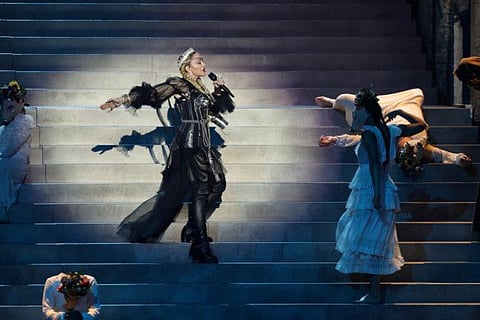How to keep Madonna at bay
Appealing to moral sense without immersing in Palestinian culture is meaningless

Sixty-year-old American performer, Madonna emerged as the ultimate winner in the Eurovision 2019 contest, held in Tel Aviv between May 14 and 18.
Although she defied international calls to abstain from normalising Israeli apartheid, she still found those naive enough to thank her for having one of her dancers wear a small Palestinian flag while on stage.
At the end of her display, Madonna returned triumphant and one million dollars richer, to her country, to resume her superficial role as a defender of women and human rights.
Thanks Iceland (and) Madonna for Disrupting Eurovision’s Big Deception, wrote Odeh Bisharat in the Israeli newspaper Haaretz.
The Iceland band, Hatari’s supposed contribution to the Palestinian cause was the waving of Palestinian flags following their performance.
These two marginal, self-serving gestures, were supposedly enough to make us forget that Madonna and Hatari entertained jubilant Israel, thus validating the Israeli regime and ignoring the numerous pleas by Palestinians and their supporters to take a moral stance for justice. Not only that, but according to Bisharat we should also thank them for the ‘too little, too late’ — pretend ‘solidarity’.
Madonna is an artiste who endorses self-aggrandising personal fame and moneymaking. Worse, she also symbolises globalised cultural hegemony which defines the US and other Western cultures’ relationship to the rest of the world. This is not ‘culture’ as in the collective intellectual and artistic achievements of these societies, but rather a set of ideological and cultural tools used by ruling classes to maintain domination over the disadvantaged, colonised and oppressed.
Madonna, Michael Jordan, the Beatles and Coca-Cola represent more than mere performers and fizzy drinks, but also serve as tools used to secure cultural, thus economic and political dominance. The fact that in some cities around the world, especially in the Southern hemisphere, Coca-Cola “flows more freely than water” speaks volumes about the economic toll and political dimension of cultural hegemony.
This issue became critical when Madonna decided to perform in Israel, as she has done repeatedly in the past, as part of the Eurovision contest. Knowing who she is and what she stands for, her decision should not come as a surprise; after all, in her September 2009 Tel Aviv concert, she sang while wrapped in an Israeli flag.
Of course, it is essential that artistes of her calibre and the contestants representing 41 different countries, are reminded of their moral responsibilities towards occupied and oppressed Palestinians. It is also important that Israel is confronted regarding its unrelenting efforts to mask its apartheid and war crimes in Palestine.
Indeed, the whitewashing of Israeli human rights violations using art — known as “art washing” — should not be allowed to continue when Gaza is under siege and where Palestinian children are shot and killed daily without remorse and without any legal accountability.
This is why such artistic events are important for the Israeli government. Israel has used Eurovision as a distraction from the blood and gore that has been taking place not far from that venue.
But should we be the least surprised? Are global music events such as Eurovision not at the heart of the western-centric globalisation scheme of cultural hegemony, the sole purpose of which is to enforce a capitalist view of the world, where western culture is consumed as a commodity, no different from a McDonald’s sandwich or a pair of Levi’s jeans?
Calling on Madonna to refrain from entertaining apartheid Israel can be considered beneficial as a media strategy, for it helped highlight, although momentarily, an issue that would otherwise have been absent from news headlines. However, by placing so much focus on Madonna, and whatever human rights’ values she supposedly stands for, we also take the risk of inadvertently validating her and the consumerist values she represents.
More so, in this Madonna-driven trajectory, we are also neglecting Palestine’s cultural resistance, the core drive behind Palestinian ‘somoud’ — steadfastness — over the course of a century.
Madonna is an expert in appearing to be morally-guided, yet hardly translates such supposed morality into anything meaningful in reality. The dancer with the Palestinian flag is case in point.
In a speech described as “powerful” by the Rolling Stone magazine, Madonna declared during a Women’s March in Washington D.C. in 2017: “to the rebellion, to our refusal as women to accept this new age of tyranny, where not just women are in danger, but all marginalised people.”
Of course, Palestinian, Lebanese and Syrian women — who have paid a heavy price for Israeli occupation, war and marginalisation — are not to be included in Madonna’s false revolution.
While it is important that we keep the pressure on those who engage and validate Israel in any way, these efforts should come secondary to embracing Palestine’s culture of resistance.
Behaving as if Madonna’s stage shenanigans represent true culture, while ignoring Palestinian culture altogether, is similar to academics addressing decolonisation from the point of view of the coloniser, not the colonised. Nations cannot truly rid themselves from the colonial mindset without having their narrative take centre stage.
Appealing to Madonna’s moral sense without immersing ourselves passionately in Palestinian art and culture will do Palestinians no good. Embracing Palestine’s culture of resistance will, ultimately, keep the self-serving, hegemonic and cheap cultural messages of the Madonnas of this world at bay.
Ramzy Baroud is a journalist, author and editor of Palestine Chronicle. His latest book is The Last Earth: A Palestinian Story (Pluto Press, 2018). He earned a Ph.D. in Palestine Studies from the University of Exeter, and is a former Non-Resident Scholar at Orfalea Centre for Global and International Studies, UCSB.


